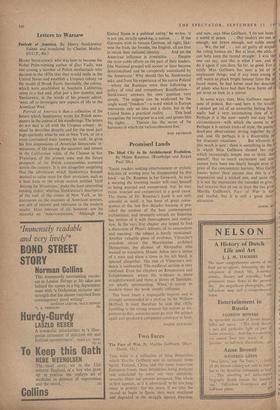Letters to Warsaw
Portrait of America. By Henry Sienkiewicz. Edited and translated by Charles Morley. (O. U. P., 40s.) HENRY SIENKIEWICZ, who was later to become the Nobel Prize-winning author of Quo Vadis, was one among a number of Polish intellectuals who decided in the 1870s that they would settle in the United States and establish a Utopian colony on the model of Brook Farm. Inevitably, the colony. which were established in Southern California, came to a bad end, after just a few months; and Sienkiewicz, in the words of his present editor, `went off to investigate new aspects of life in the American West.'
Portrait of America is thus a collection of the letters which Sienkiewicz wrote for Polish news- papers in the course of his wanderings. The letters do not deal at all with the Utopian colony: in- stead he describes directly and for the most part high-spiritedly what he saw in New York, or on a trans-continental train journey he took; he gives his first impressions of American democratic in- stitutions, of life among the squatters and miners in the Californian wilds, of the Chinese in San Francisco, of the present state and the future prospects of the Polish communities scattered across the country. It is not altogether surprising that the adventures which Sienkiewicz himself seemed to value most for their exoticism, such as a bear hunt or the whole section entitled 'Idyll Among the Mountains.' make the least interesting reading today; whereas Sienkiewicz's description of the look of the streets of New York, or his comments on the manners of American women, are still of interest and relevance to the modern reader. Most relevant of all, however, are his remarks on 'Americanisation.' Although the
United States is a political entity,' he writes, 'it is not yet, strictly speaking, a nation. . . . If the Germans wish to remain German, all right; like- wise the Irish, the Swedes. the English. all are free to retain their national identity. . . . And yet the American influence is irresistible, . . . Despite the most noble efforts on the part of their leaders, [the National groups] will sooner or later become denationalised and be completely assimilated by the Americans.' Why should this be. Sienkiewicz asks, and from his experience of his native Poland —where the Russians were then following a policy of total and compulsory Russification- Sienkiewicz answers his own question very simply. 'The enigma can be explained by the single word "freedom"—a word which in Europe represents only an idea and a claim, but in the United States a practical reality. . . . This land recognises the immigrant as a son, and grants him his rights. . . . Therein lies the secret of the harmony in which the various elements live.'
DAN JACOBSON


































 Previous page
Previous page